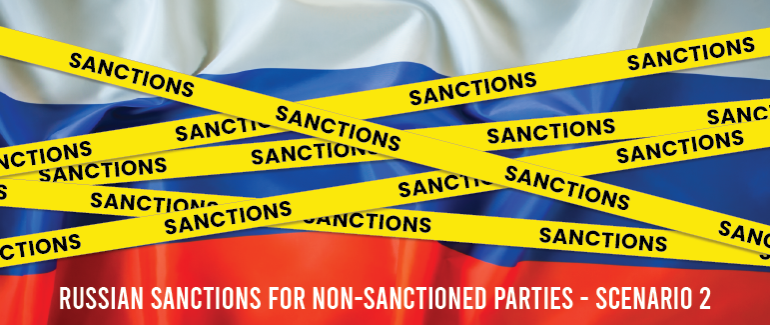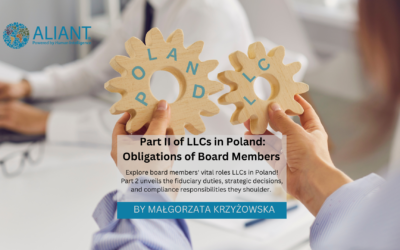We present to you the 1st scenario of the 5-part series on “Conducting International Business and Commercial Transactions for Non-Sanctioned Parties: a 4 Scenarios Case Study”.
In this scenario we discover a situation where a contract performance of non-Russian business might become frustrated due to sanctions against Russia, such as closed airspace and shipping prohibitions, freight forwarders no longer are able to arrange carriage, and insurance companies no longer will ensure the goods against risk of loss (Please see Part 1 of these series to see those sanctions). Additionally, we discuss a situation if the letter of credit for the transaction is issued by one of the seven Russian banks that now are blocked from the SWIFT network.
The information provided in this article does not, and is not intended to, constitute legal advice. Instead, these illustrations and the discussion that follows are intended to illustrate the complexities of the business and legal issues now at the forefront of cross-border business in Europe, Switzerland, the UK, the United States, Canada, Japan and Australia now that the 2022 Russian sanctions have turned once-straightforward business dealings between Russian entities and non-Russian counterparts into anything-but-simple high-stakes legal navigational puzzles, as well as to provide some general observations about the attendant legal issues.
I. First Scenario – Practical Analysis
The first scenario consists of the following:
First, when looking at the transaction at that moment, the non-Russian business did not appreciate that its performance of the contract might become frustrated or made impossible by virtue of no longer being able to fulfill the CIF (Carriage, Insurance Freight) requirements, or get paid under a documentary letter of credit for the transaction because, as a consequence of sanctions measures such as closed airspace and shipping prohibitions, freight forwarders no longer are able to arrange carriage, and insurance companies no longer will ensure the goods against risk of loss. Additionally, the non-Russian business may not have appreciated the risk that the letter of credit for the transaction – issued by one of the seven Russian banks that now are blocked from the SWIFT network – in effect will have become non-negotiable by the Negotiating Bank (who negotiates the documents pertinent to the LC that the non-Russian business delivers to the negotiating bank) because the issuing Russian bank has been disconnected from the SWIFT system, resulting in the Negotiating Bank no longer being able to communicate the documents through SWIFT to the issuing Russian bank (i.e., the standard, immutable practice throughout the international banking system).
II. FIRST SCENARIO
Generally
In a scenario in which the performance of a cross-border commercial contract has been interfered with by an unexpected event, and payment is to be made through an irrevocable commercial documentary LC (“Documentary LC”), the starting point for determining the parties’ respective responsibilities is the contract itself, followed by consideration of the effect of the unexpected interference with performance on the negotiability of the LC.
In all events, the parties first will seek to determine whether the remains any means of each of the parties fulfilling its contractual obligations to the another. And, if not, then each party must determine for itself, and in consultation and negotiation with the other party, how best to close out the uncompleted transaction with the least legal exposure to the other, as well as maximum mitigation of one’s own direct economic damages – i.e., recovery of performance costs to that point.
Relevant Contract Law: Near-Uniform Principles in Across Jurisdictions
In the context of analyzing and determining the impact of sanctions on the parties’ respective obligations under sanctions-interfered contracts, a series of mixed questions of fact and law must be asked and answered:
● Have sanctions – or the collateral effects of sanctions – interfered with either or both of the parties’ performance of contractual obligations?
In particular:
• Seller’s capacity to produce and timely deliver in accordance with the contract delivery terms (typically CIF (Carriage, Insurance, Freight)[1];
• Buyer’s capacity to effect timely payment in accordance with the contract payment terms (typically by Documentary LC in favor of Seller, the LC beneficiary, that Buyer provides through arrangements with a mutually agreed-upon issuing bank);
● Does either the contract – or the law governing the contract – define such collateral effects of sanctions as force majeure, and, therefore, entitle the parties to suspension of contract performance for the duration of the force majeure event?
● If, as a matter of law, the interfering events do not constitute a force majeure event, then:
• Does the change in such circumstances that unforeseeably occurred after the contract was entered into make either buyer’s or seller’s performance worthless to the other, thus frustrating the purpose in making the contract.
Under such circumstances, each non-performing party to be excused from all further performance obligations as well as contractual liability under the legal doctrine of frustration of purpose, provided:
► The law governing the contract recognizes frustration of purpose doctrine;
► There is no alternative method of performance; and
► Neither the governing law nor the contract makes one of the parties responsible for the frustration event.
• Does the change in such circumstances make either buyer’s or seller’s contract performance objectively impossible?
Similar to the result in the doctrine of frustration, under such circumstances, a non-performing party may be excused from all further performance obligations and contractual liability under the doctrine of impossibility, provided that:
► The law governing the contract recognizes the doctrine of impossibility;
► There is no alternative method of performance. Otherwise, the doctrine would not apply because performance, while difficult or expensive, would be possible;
► The incapability to perform is objectively impossible – meaning that the party claiming impossibility has tried all practical alternatives to avoid the impossibility of performance’ and
► A party seeking relief under the impossibility defense did not contribute to the occurrence of the impossibility of performance.
1. Position of the Non-Russian Seller of Goods Under a CIF Contract
Under a CIF contract, the non-Russian seller owes the following performance obligations to the non-sanctioned Russian buyer, each of which has become impracticable, and perhaps impossible as a consequence of the collateral effects of Russian sanctions:
● To contract for carriage of the goods (i.e., ocean or air freight to Russia);
● To contract for insurance of the goods to cover risk of loss in transit;
● To timely place the goods “on board” the nominated vessel or aircraft by the contractually-specified “ship by” date;
● To negotiate the documents through the LC “negotiating bank,” by presenting the required documents to the negotiating bank, that ordinarily “negotiates” the LC documents to the issuing bank in Russia via the SWIFT system.
Such documents include, but are not limited to the following documents that the present circumstances make impracticable to impossible for seller to obtain and negotiate:
▪ The Certificate of Insurance, which, together with the contract for insurance, is now impracticable to impossible for a seller to obtain and negotiate under the LC because insurance companies have ceased issuing insurance for shipments to Russia; and
▪ An “On Board Certificate” issued by the master of the vessel once the goods are on board the vessel, or an equivalent provided by the air cargo carrier, which also is now impracticable to impossible for a seller to obtain and negotiate under the LC because, as a consequence of sanctions: (1) ships have ceased carrying cargo to Russia; and (2) air cargo carriers also have ceased operating to Russia, either because the Russian government has closed Russian airspace to such aircraft, or air cargo carriers have elected to cease Russian operations because of war and business risk.
Accordingly, the seller will be compelled to claim excuse from all performance obligations.
To be most effective in obtaining this relieve through negotiations with buyer (as well as the LC banks), seller should obtain the assistance of a legal team consisting of accomplished international sanctions lawyers plus commercial lawyers who are licensed and experienced in the jurisdiction of the law that governs the contract.
Additionally, Seller simultaneously will be pursuing effective means of mitigating damages, including:
● Seller’s re-sale of the goods that are the subject of seller’s now-excused contract with buyer, if practicable, or scrapping of the goods if not practicable; and
● Seller making and pursuing business-interference claims under any insurance policies maintained by seller that might provide such coverage.
For best effect, seller’s preparation and submission of such insurance claims should be done in consultation with highly-experience insurance litigation lawyers practicing in the jurisdiction in which the insurance policy dispute provisions establish as the forum for dispute resolution.
2. Position of the Non-Sanctioned Russian Buyer under a CIF Contract
Under a CIF contract, the non-sanctioned Russian buyer owes the following performance obligations to the non-Russian seller, only one of which has become impracticable or arguably impossible of performance as a consequence of the collateral effects of Russian sanctions:
● To provide a commercial documentary LC from a mutually acceptable international financial institution.
In this scenario, seller did so by providing an LC issued by Sberbank – a Russian bank that, through no fault of seller or buyer, is now sanctioned and is now excluded from SWIFT.
● To accept the goods when delivered to Buyer in Russia in accordance with the CIF contract.
For the reasons discussed immediately above, this is now certainly impracticable, and highly likely objectively impossible.
Buyer, not having any prospect of receiving the goods, also has grounds for claiming relief from its performance obligations and any liability to seller under the contract.
Buyer will seek: (1) early termination of the LC by consent of seller and the LC banks; and (2) release of the credit support or cash collateral, or combination thereof, that Buyer provided to the issuing bank to obtain the LC. Please see discussion of the Second Scenario, immediately below, for a more detailed discussion of this process.
In the most likely circumstance, buyer will require the release of the LC credit support/cash collateral to enable buyer to arrange a replacement LC in support of a “cover” contract for the goods with another supplier – assuming that the buyer is able to:
● Locate and contract with a “cover” supplier that is willing to do business with a Russian company under the present circumstances and is able to fully perform by producing and shipping the goods to Russia; and
● Arrange a replacement LC with a financial institution acceptable to the “cover” supplier – i.e., one that can accept seller’s negotiation of the LC documents and make payment under the LC.
Each of these actions presents the buyer with daunting challenges under the present circumstances.
Indeed, the likelihood of the non-sanctioned Russian buyer being able to find a “cover” seller and to arrange a functioning LC are practically nil.
* * * * * * * * * * * *
In any event, upon the realization that sanctions might affect the transaction, it is advisable and appropriate for all parties to the transaction, as well as the business agent, to seek counsel from attorneys highly experienced in the applicable sanctions law, in addition to the parties’ respective transaction counsel.
Check out our next episodes discussing the three other scenarios!
—————————————————————————————————————————————————————————————–
[1] Most cross-border contracts for the purchase and sale of goods incorporate the International Commercial Terms (“Incoterms”) into the contracts as the governing set of universally understood terms. (Incoterms are published periodically by the International Chamber of Commerce.) Each Incoterm contains a set of rules of interpretation for the obligations of seller and buyer.
Incoterms are divided into four principal categories for delivery of goods, each bearing distinct risk-allocations: (1) Category E (Departure): Ex Works (EXW); (2) Category F (Main Carriage Unpaid): Free Carrier (FCA), Free Alongside (FAS), Free on Board (FOB); (3) Category C (Main Carriage Paid): Carriage Paid To (CPT), Carriage and Insurance Paid (CIP); Cost and Freight (CFR); and Cost, Insurance, Freight (CIF); (4) Category D (Arrival): Delivered at Place (DAP); Delivered at Place Unloaded (DPU); and Delivered Duty Paid (DDP).
The Incoterm subcategories are applicable according to the means of transportation, as follows:
Incoterms for any mode of transport: EXW, FCA, CPT, CIP, DPU, DAP and DDP; and
Incoterms only for sea and inland waterway transport: FAS, FOB, CFR and CIF.




